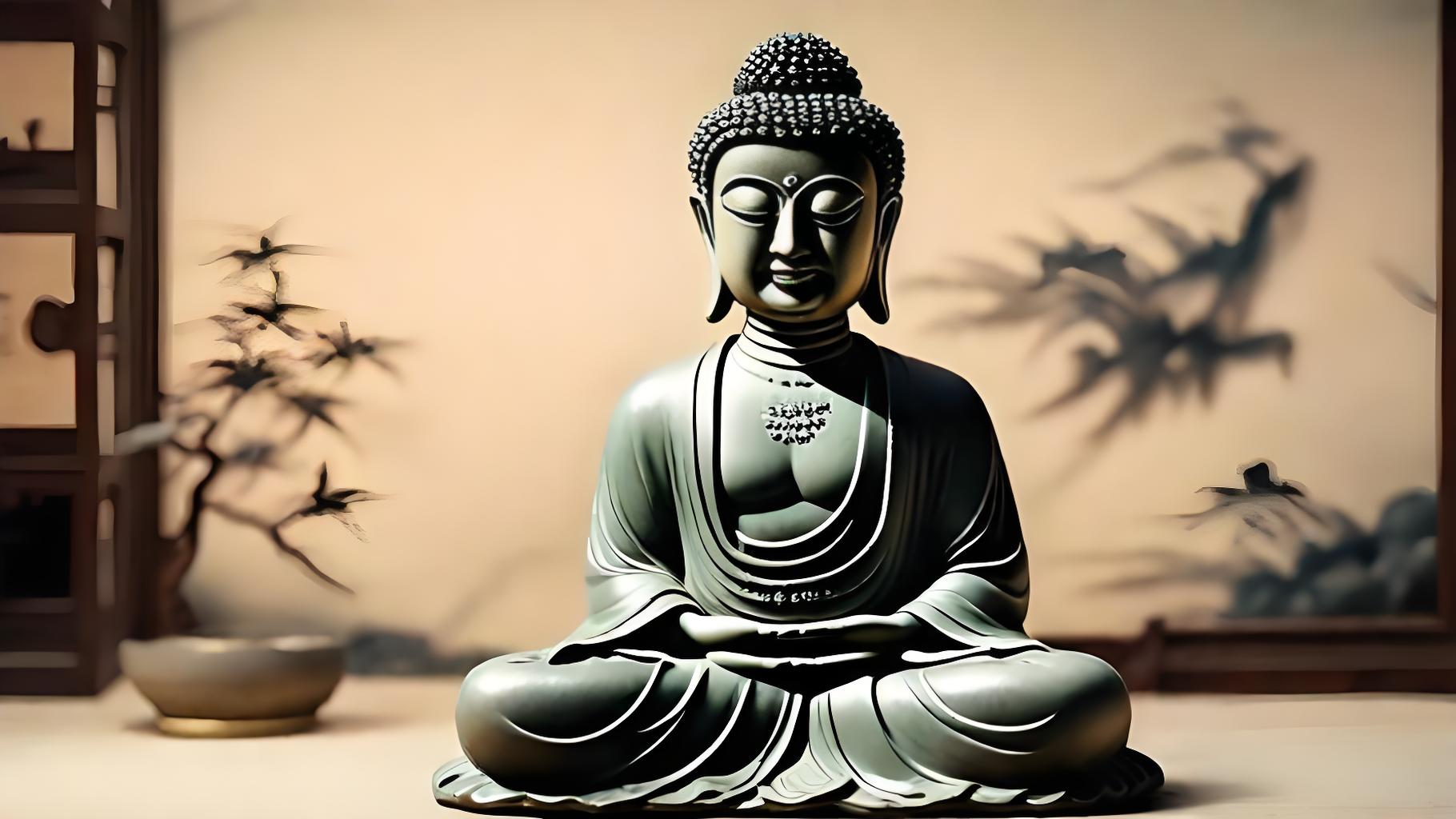The law of karma is not something established or created by the Buddha. It is an objective law of existence that the Buddha simply revealed. As Master Yin Guang stated, “Whether Buddhas attain enlightenment or sentient beings fall into the three lower realms, none are outside the scope of karma.”
This illustrates that even Buddhas and Bodhisattvas cannot transcend the law of karma. How much more so are ordinary beings like ourselves, who, whether we believe in it or not, are bound by its constraints. Therefore, understanding karma is an essential prerequisite for studying Buddhism.
Understanding the Law of Karma
Karma, also known as ye, encompasses cause, condition, effect, and retribution. Ye, a Sanskrit term, means action or activity. It refers to all physical and mental activities, including the three karmas of body, speech, and mind. These actions can be wholesome, unwholesome, or neutral. Neutral karma does not lead to direct consequences. The invisible karma holds immense power; indeed, our lives are governed by it.
Karma is the cause, the reason behind our experiences. Effect is the result. Retribution is the consequence. Conditions are the factors that, when combined with a cause, produce an effect. A Buddhist verse clarifies this: “Even after hundreds of thousands of eons, the karma created will not disappear. When the right conditions arise, the retribution will be experienced.” Every action, word, and thought plants a cause, creating karma.
Depending on the nature of the cause, we receive good or bad consequences. Good deeds lead to good results, and bad deeds lead to suffering. This is the law of karma. Our lives are subject to this objective law.
Karma and the Cycle of Rebirth
Karmic cause and effect are closely related to the cycle of birth and death. The cycle continues because of the progression from cause to effect and back to cause, leading to continuous reincarnation. Our births and deaths are determined by karmic forces. Karma, like information, is stored in the eighth consciousness called alaya. It carries past karma into this life and creates new karma. Through this cycle, joys and suffering arise. Indeed, the Buddha taught that “one reaps what one sows.” This is a key part of the heart of buddhist teaching.
According to Yogacarabhumi-sastra, “What has been done will not be lost.” Before a cause leads to an effect, it does not disappear. Conversely, without a cause, there is no effect. Every effect has a cause. Where do we go after death? It depends on our karma. Minor actions create the cycle of the six realms. These realms reflect our wholesome and unwholesome actions.
Benefiting others is good, while harming others is bad. Good deeds help both others and yourself. Buddhist scriptures classify actions into ten categories, further divided into upper, middle, and lower degrees. These are the ten wholesome and ten unwholesome actions. The ten unwholesome actions are killing, stealing, sexual misconduct, lying, divisive speech, harsh speech, idle chatter, greed, anger, and delusion. The ten wholesome actions are the opposite of these.
The level of these actions impacts our rebirth. Upper-level wholesome actions lead to heavenly realms; middle to human realms; and lower to asura realms. On the other hand, upper-level unwholesome actions lead to hell realms; middle to ghost realms; and lower to animal realms. These teachings are based on the Buddha’s wisdom. The law of karma is not a human creation, but a discovery. Even Buddhas follow this law, according to Master Hsu Yun.
Master Xingyun has noted that pure causes lead to pure effects and that defiled causes lead to defiled effects. Karma is more precise than a computer. As the saying goes, “Heaven is three feet above your head.” Our minds connect with heaven, spirits, and Buddhas. Every thought is noticed. Master Yin Guang said, “Our minds are interconnected with the minds of heaven, spirits, and all Buddhas and Bodhisattvas.” Zhou Anshi said, “When everyone understands karma, the world will be at peace.” The universe records everything.
Karma’s Reach Across Lifetimes
The Nirvana Sutra states, “The law of karma of the three lifetimes is a cycle that never fails.” Some believe that life is coincidental. They question karma when good people suffer and bad people prosper. But, they misunderstand karma’s operation across lifetimes.
A Buddhist verse explains, “If you want to know the causes of your past lives, look at the effects you are experiencing in this life.” Present experiences are due to past actions. Also, our current actions impact future lives. Cause and effect work continuously. Our past karma continues to affect us, and the results are experienced when conditions are right.
The three lifetimes concept might refer to past, present, and future lives, but also to last year and next year or the previous and next moment. Modern science supports the idea that every phenomenon has a cause.
Karma’s retributions vary in timing. Immediate retribution occurs in the current life. Next-life retribution occurs in the following life. Finally, future-life retribution occurs later on.
Bad people experiencing good fortune have past good deeds that are not exhausted. However, their current bad deeds will eventually lead to suffering. Similarly, good people experiencing misfortune have past negative karma that has not been resolved. Their current good deeds will create future positive results.
Transforming Your Karma
While karma is a law, it is not inflexible. Unlike fatalism, it recognizes our ability to change. The effects we experience are results of past causes, that also create future consequences. If causes change, the effects will change. While past causes cannot be altered, conditions can be changed. We can choose to stop negative actions.
For a cause to lead to an effect, there must be a condition. Conditions can be altered. For example, you cannot change a melon seed into a bean seed. However, you can choose to plant a bean seed instead of a melon seed. The results depend on conditions like soil, fertilizer, and water. By altering the conditions, we can influence the outcome of our karma. If we stop negative actions and do good, bad conditions will be eliminated. We all have both good and bad karma. The key is to stop creating more bad karma. This allows good karma to ripen. We should actively change our destiny instead of relying on fortune-telling.
Our physical body is the result of karma. Actions are the causes, our parents are the conditions, and our body is the effect. The six realms are due to karma. Our life is about repaying karmic debts. The primary retribution includes appearance and lifespan. The secondary includes the environment. Ultimately, our destiny is a result of our actions, not some external force. Buddhism explains the reasons behind fate but doesn’t support fortune-telling. Only by altering the causes of the present can we change the future. This demonstrates the flexibility of the buddhist belief in karma.
Karma Transformation Through Mind
The mind is where good and bad seeds are planted. These grow to create wholesome and unwholesome results. The Avatamsaka Sutra says, “Everything is created by mind alone.” Our thoughts are the key to changing our destiny. The mind creates and transforms karma. Huineng said, “All fields of merit are inseparable from our own mind.” Our environment and destiny change with the mind. The Heart-Mind Contemplation Sutra states that the mind is the source of all actions and retribution.
Ancient wisdom states, “Good and evil will ultimately be repaid.” Confucianism also states that “misfortunes are brought upon ourselves.” Our karma is created by the mind, therefore, blessings and misfortunes are also brought upon ourselves.
Approaching Karma with Understanding
Many people rely on fate. They seek fortune-telling, not inward reflection. Others pray to Buddhas without changing their own actions. They are looking outside of themselves. They do not follow the Buddha’s teachings. It is impossible to find good fortune by these external methods.
We need deep faith in karma. It is at the heart of buddhist teaching. Without faith, one cannot understand Buddhism. Master Hsu Yun said, “The two words ‘karma and effect’ encompass all of the Buddha’s teachings.” Master Dingyin said that the Buddha’s teachings can be summed up as “cause, effect, and retribution.” We must not misunderstand the law of karma.
Bodhisattvas understand karma deeply. They avoid bad causes. Ordinary people do not fear karma and act without consideration. Only when the results are experienced do they feel fear. Ksitigarbha Bodhisattva teaches avoiding the causes of the ten unwholesome actions, as it results in rebirth in hell realms.
We should practice according to the Buddha’s teachings, repent wrongdoings, cease evil, do good, be mindful, and cut off unwholesome conditions. Through this, bad karma decreases and good increases. In addition, we should take refuge in the Three Jewels, follow the Five Precepts, practice the Four Immeasurables, benefit all beings, and attain Buddhahood. ”’ content_copy Use code with caution.


